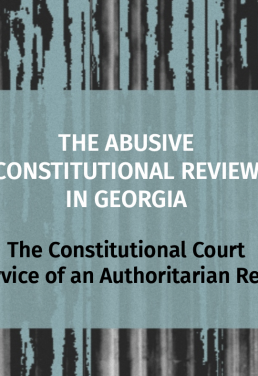საერთო ცხელი ხაზი +995 577 07 05 63


Constitutional democracy is under threat across the globe, as leaders in a number of countries seek to undermine its foundations. What distinguishes the recent wave of attacks on democracy is their appearance of legality. Today’s autocrats primarily rely on both formal and informal constitutional amendments, as well as normal legal mechanisms, to reshape the constitutional order in a way that tilts the electoral playing field in their favor.
One of the key tools modern autocrats employ is the abusive judicial review. In this context, justice becomes powerful instrument of authoritarian regimes, and the judiciary—particularly apex courts—becomes an integral part of the regime’s long-term strategy.
Recent academic literature increasingly analyzes the abuse of certain judicial actors - constitutional courts and constitutional review. A theoretical framework on this topic was introduced by David Landau and Rosalind Dixon in their 2020 article, Abusive Judicial Review: Courts Against Democracy[1]. The framework defines the concept of “abusive constitutional review” and explores its logic and typology within authoritarian strategies—explaining why and how regimes co-opt courts, and distinguishing between “strong” and “weak” forms of such abuse. In its weak form, constitutional courts support or enable authoritarian tendencies through silence or strategic concessions. In its strong form, courts actively participate in dismantling democratic and constitutional order. Ultimately, abusive judicial review entails a parasitic use of trust and legitimacy (if any exists) of courts by fundamentally illegitimate regimes. While such strategies require careful timing and execution, failure can render courts ineffective tools for the regime and cause them to lose both institutional independence and public trust—often leaving them buried under the regime’s collapse. Rebuilding from such a collapse demands full-scale reform of the judiciary and years of its legitimacy restoration.
This document applies that theoretical lens to the Georgian model of abusive constitutional review. Despite its unique characteristics, the Georgian case fits squarely within the conceptual framework. Drawing on an analysis of institutional, legislative, and personnel changes throughout the Constitutional Court of Georgia’s history—as well as the Court’s recent jurisprudence on key constitutional matters—this paper examines how one of the most trusted institutions of the post-independence period has become first a silent partner to political power with authoritarian leanings, and eventually an active enabler of authoritarian consolidation. The consequences of its decisions continue to have a devastating impact on Georgia’s deepening political, social, and constitutional crisis.
It must also be acknowledged that this critique of the Constitutional Court of Georgia is both necessary and belated. It took years for civil society and the broader public to confront the uncomfortable truth of the Court’s political capture—despite the fact that, in retrospect, the turning point came in 2016. This realization was delayed even as government-friendly judges were appointed, key cases were stalled for years, and the Court shifted into strong forms of abusive review. This trajectory unfolded differently from the well-documented failures of the common courts’ reform process, which has long been the subject of consensus and critique, and which, ironically, contributed to the Constitutional Court’s own institutional decline.
Nevertheless, in the face of Georgia’s ongoing democratic regression and institutional capture, a systemic critique of this process remains vital. Only by properly diagnosing the problem can we hope to find long-term solutions—should the opportunity for democratic renewal arise. This document is one such attempt and is intended to contribute to public discourse on Georgia’s future, and, in the event of change, to the deep institutional recovery of the Constitutional Court and the rebuilding of public trust in its role.
[1] David Landau, Rosalind Dixon, "Abusive Judicial Review: Courts against Democracy," UC Davis Law Review, Vol. 53, 2020, Georgian translation available at: https://cutt.ly/zrcEGzLi; accessed on: 27.05.2025.
[1] დევიდ ლანდაუ, როზალინდ დიქსონი, „სასამართლო კონტროლის ბოროტად გამოყენება: სასამართლოები დემოკრატიის წინააღმდეგ“, UC Davis Law Review, Vo. 53, 2020, ქართული თარგმანი ხელმისაწვდომია: https://cutt.ly/zrcEGzLi ; წვდომის თარიღი: 27.05.2025.
The website accessibility instruction